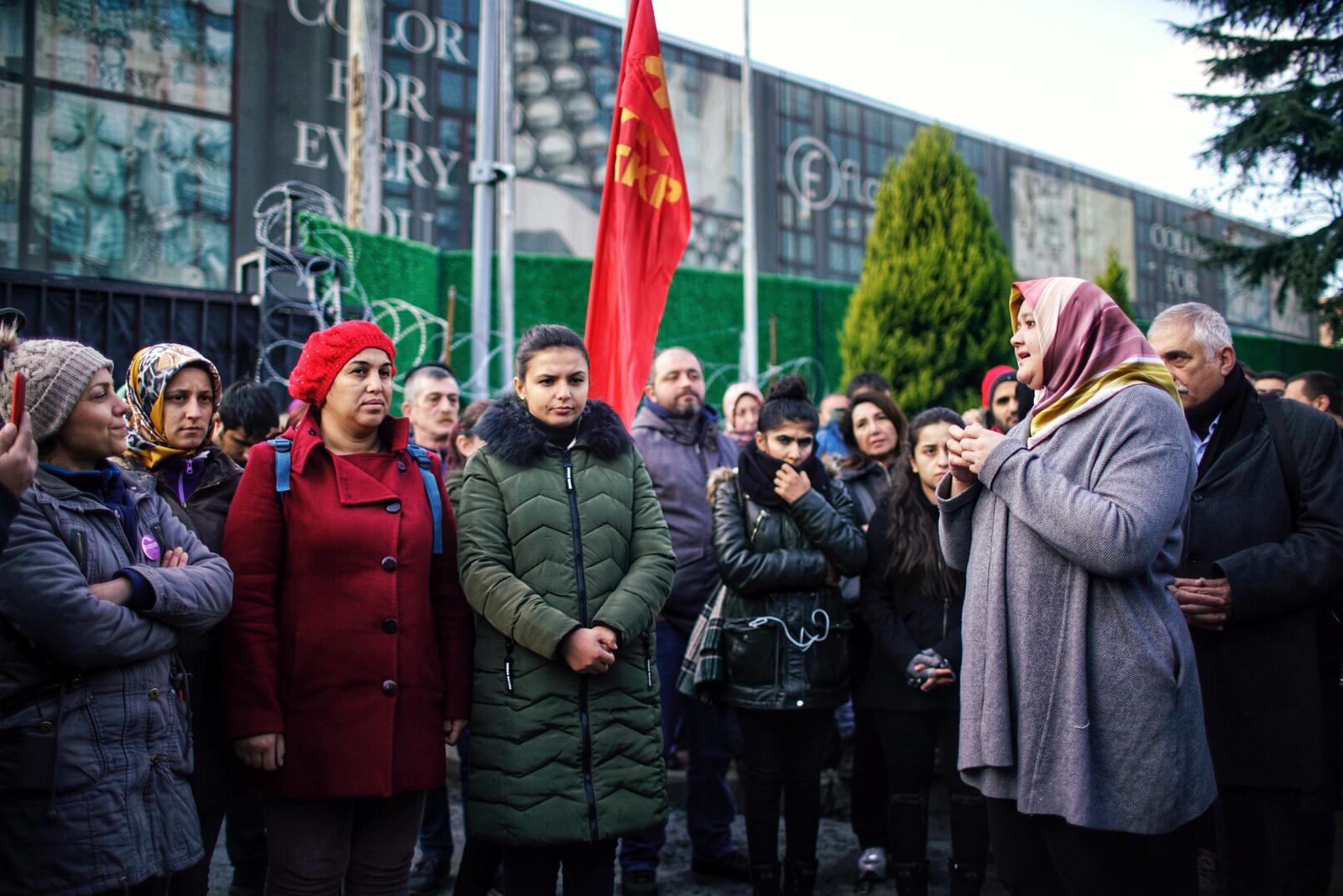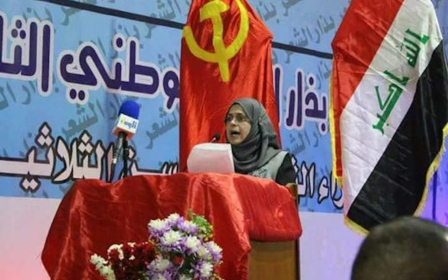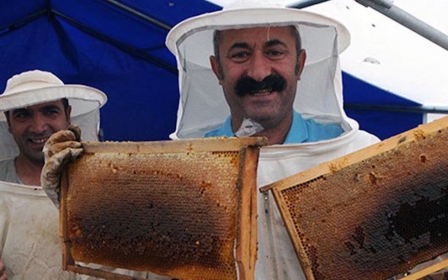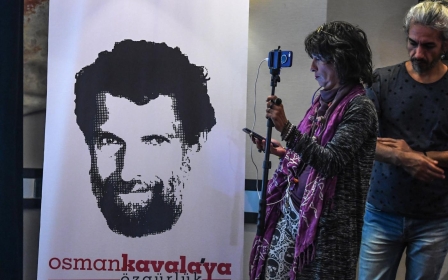Headscarf-wearing communist candidate set to shake up Istanbul elections
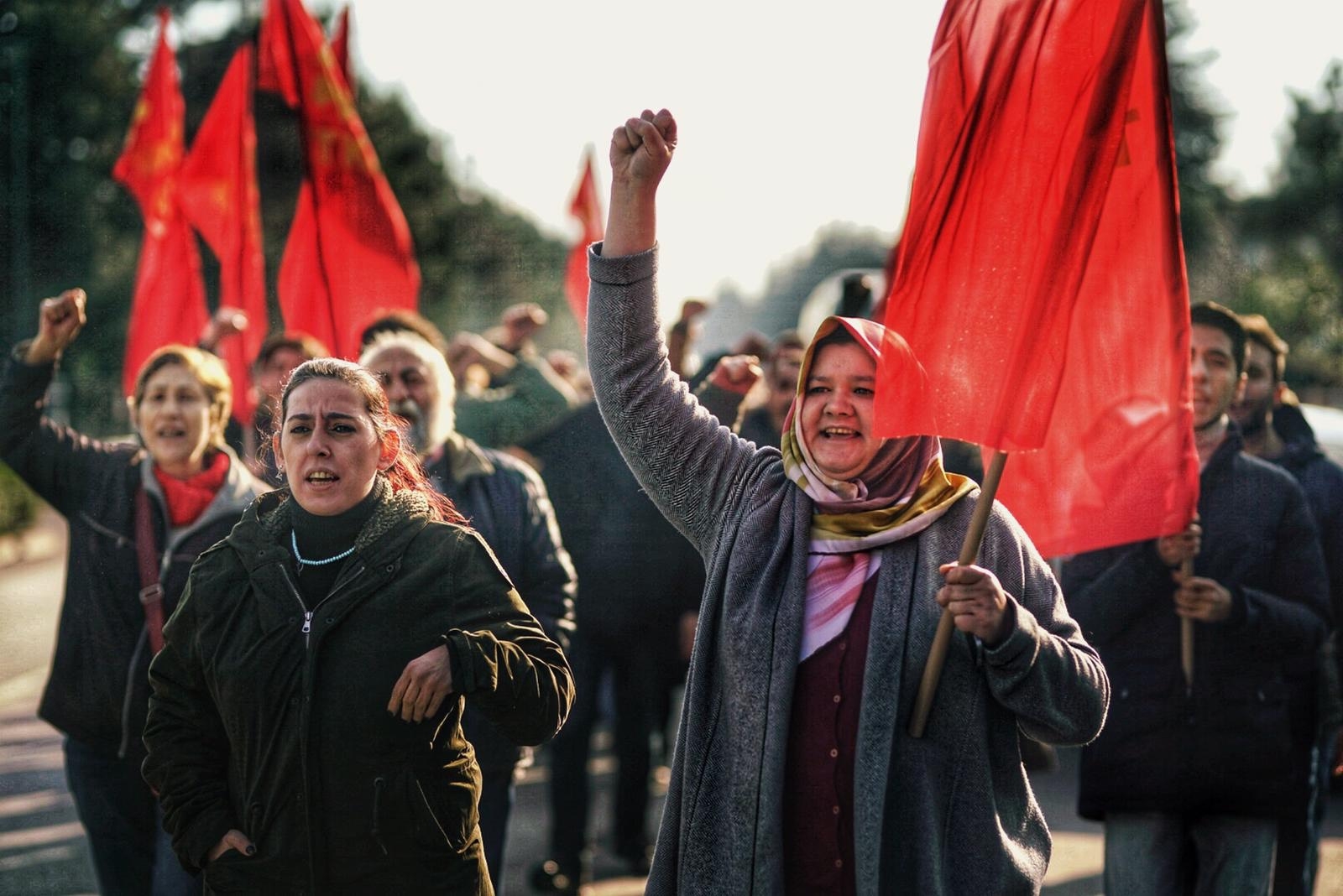
Fatma Akin, a textile worker, has been struggling to make ends meet for the last eight years in horrible workplace conditions - sewing for 11 hours in damp and dark basements.
Now she is standing as a candidate for the upcoming municipal elections in Istanbul - as a candidate for the communist party. Her direct experience of exploitation pushed her to take the stand, she says.
“I worked in textile ateliers for seven years. I love sewing. But I have vitamin D deficiency due to the lack of sunlight in there for six days of the week. There are many children workers. It is concerning for everyone in the room because they are either a father or a mother. It is very sad. When you see them, one feels the injustice oneself," she told Middle East Eye.
"That led to a search in my life. That’s why I’m campaigning, to defend ourselves.”
Akin has been nominated as the Turkish Communist Party (TKP) municipal mayoral candidate for the conservative, working-class Gungoren district in Istanbul - a move which has raised eyebrows, as Akin is a headscarf-wearing Muslim in a party known for its staunch secularism.
New MEE newsletter: Jerusalem Dispatch
Sign up to get the latest insights and analysis on Israel-Palestine, alongside Turkey Unpacked and other MEE newsletters
In an interview with MEE in Istanbul, Akin said her nomination didn’t have anything to do with the fact that Gungoren was a religious neighbourhood.
'This isn’t about religion. This is about protecting our rights as a class'
- Fatma Akin, TKP
“There are plenty of textile workshops in the district. I just live one block away. Our focus isn’t about Islam. It's about workers’ rights and helping my fellow colleagues,” she said.
“I’m a woman, I’m a worker, I’m a communist."
The slogan for her upcoming campaign is "We are not in the same boat" - a reference to comments made by Turkish President Recep Tayyip Erdogan in the wake of the country's economic crisis, which has seen sharp rises in inflation and the collapse of the currency.
She said her commitment to the cause had come at a price, however.
“I was recently laid off by the workshop I was working for. Because young workers were approaching me and trying to learn more about communism," she said.
Secular tradition
The TKP, the latest incarnation of a Turkish Marxist-Leninist tradition with roots stretching back to before the founding of the republic, has long upheld secularism as a major principle.
Akin's nomination, therefore, created a small controversy among the Turkish left on social media, who were quick to remind the party leadership that TKP had been actively campaigning against the “turban”, a term communists and secularists in Turkey use to describe the “politicised” version of the headscarf.
TKP was also at the forefront of opposition to the removal of the headscarf ban in Turkish universities in the recent past. Its declaration titled “What does the turban cover?" still echoes in public forums when the issue is debated.
Sol, the publication closely associated with the party, has also published columns on a similar theme.
However, Akin says she has never received any discrimination from her comrades.
“I think people have misperceptions about what TKP is standing for. This isn’t about religion. This is about protecting our rights as a class," she explained.
"If TKP didn’t have candidates with headscarves before, it was because of their absence in the party. Not a preference. Women with headscarves aren’t informed about us.”
She added that she had received a number of death threats, and had endured sexist abuse.
On other platforms, such as Twitter, some users accused the TKP of opening the door to Islamism and populism. The debate has led the TKP to respond to the criticisms with a separate press release, saying that the party was still standing for secularism and opposing religious politics.
“Fatma Akin was nominated not because of her headscarf. She was nominated because she was a communist worker," read the statement.
Akin, who was born and raised in coastal Black Sea town of Giresun, says her family was always left-leaning and for her to join the TKP wasn’t a tectonic shift in her life.
“I have been following their activities for some time. And I have decided to become a member. I joined them because they defend workers’ rights, and improving our conditions as workers. The best thing I love about the party is you can address everyone on a first name basis," she said.
The chances for Akin’s victory in local elections are quite slim. In the previous local elections in 2014, TKP didn’t receive any votes at all in the district and - with the possible exception of the colourful mayor of the village Ovacik in Tunceli province - the party has little profile or political power.
The Turkish Supreme Election Board also prevented TKP from taking part in the 24 June parliamentary elections, allegedly over rule violations (which the party strongly contested).
In any case, Akin’s nomination also received a widespread welcome by Turkish left. Prominent leftist journalist Ismail Saymaz, among others, congratulated both the TKP and Akin for the move.
Thousands of tweets were sent on social media to support her cause, while many of her textile worker colleagues called her expressing support.
“We are distributing leaflets with my husband every day. I’m visiting the coffeehouses. The people we talk with usually are very friendly," she said.
"They see me as their daughter and most of them congratulate me and wish me best of luck. Some say 'you should be ashamed of your headscarf'. I just carry on and tell them my point of view. They aren't conscious.”
This article is available in French on Middle East Eye French edition.
Middle East Eye delivers independent and unrivalled coverage and analysis of the Middle East, North Africa and beyond. To learn more about republishing this content and the associated fees, please fill out this form. More about MEE can be found here.


